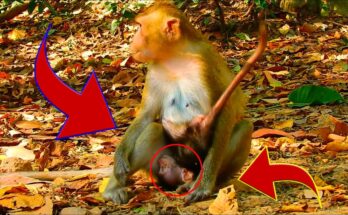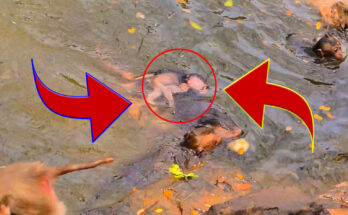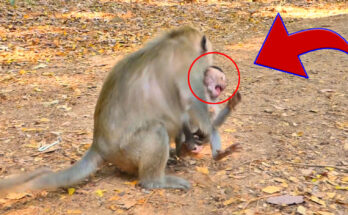There’s a certain irony in the way humans view the natural world. We often look at animals through a lens of sympathy and concern, imagining ourselves as the saviors of those less fortunate, unable to see that, in some cases, the roles might actually be reversed. The idea of a child being denied milk from their mother seems like a tragic situation, one that would likely elicit pity and anger from most people. But what if I told you that, in some cases, not being allowed to drink milk from our mothers could actually be the better outcome? This might sound strange, even cruel, but let’s examine it closely and reconsider the relationship between us and nature.
The image of a monkey being prevented from drinking milk from its mother might evoke feelings of sadness. Yet, the same idea, when applied to humans, can lead us to question the very nature of dependency. Monkeys, like many mammals, are naturally dependent on their mothers for nourishment during their infancy. In the wild, the relationship between mother and offspring is an intricate one, designed for survival. The mother nurtures, protects, and, most importantly, feeds her young, ensuring they grow strong enough to navigate the harsh realities of life in the wild.
However, what happens when we step away from this natural cycle and enter the realm of human intervention? Modern society, with all its advancements in medicine, technology, and nutrition, has led to an era where human dependency on mother’s milk is not as absolute as it once was. In fact, there are times when it might actually be better for a child, or even an adult, to avoid milk entirely. This is where the question of whether a “poor monkey” is actually doing us a favor comes into play.
For one, milk, especially cow’s milk, contains proteins and sugars that aren’t always ideal for human consumption. Lactose intolerance, a condition where individuals cannot properly digest lactose—the sugar found in milk—affects a significant portion of the population worldwide. The inability to break down lactose can cause discomfort, bloating, cramps, and even more severe gastrointestinal issues. In fact, humans are one of the few species that continue to consume milk into adulthood, and for many, this can be problematic.
Given that so many adults are lactose intolerant or struggle with digesting dairy, it’s clear that milk from our mothers, or any milk for that matter, isn’t necessarily the miracle food it’s sometimes cracked up to be. But what about the specific case of drinking from one’s mother? In the wild, some species of monkeys rely on breastfeeding for a few months to a few years, depending on the species. While human infants are still dependent on breast milk in the early stages of life, this is only a small part of the picture.
Breastfeeding offers essential nutrients and antibodies that help infants develop a strong immune system. It also strengthens the bond between mother and child. Yet, as a child grows and matures, their body begins to require different nutrients that breastfeeding can no longer provide. At this point, the child needs solid food, a diet that is more varied and better suited to their developmental stage. So, what would happen if a monkey—just like a human—was never weaned from its mother’s milk? What would be the consequences of an extended reliance on milk beyond infancy?
In the wild, an animal that cannot or will not adapt to this natural weaning process risks being weaker and less equipped to face the world on its own. Similarly, humans who continue to consume milk into adulthood, particularly if they are lactose intolerant, may find themselves struggling with their health. So, when the “poor monkey” is denied milk from its mother, it may be experiencing a tough transition. But in reality, this denial could be the very thing that pushes it toward a more independent, stronger existence.
This dynamic is not just limited to monkeys or humans. It is a broader reflection of nature’s way of encouraging growth and adaptation. When we’re forced to step away from something, even something as comforting as our mother’s milk, we often find that we develop new strengths, new ways of surviving, and new paths to fulfillment. It’s the refusal of dependency that makes us resilient.
So, in a sense, when the “poor monkey” is prevented from drinking milk from its mother, it might be an act of tough love—a push toward greater independence, stronger health, and the kind of growth that only comes when we’re forced to face the world on our own. Therefore, in the end, the monkey’s fate may not be as tragic as it initially seems. In fact, it could be a blessing in disguise.


